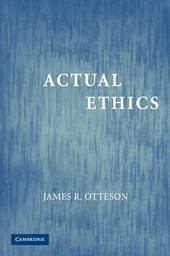
|
Actual Ethics
Paperback / softback
Main Details
| Title |
Actual Ethics
|
| Authors and Contributors |
By (author) James R. Otteson
|
| Physical Properties |
| Format:Paperback / softback | | Pages:368 | | Dimensions(mm): Height 229,Width 162 |
|
| Category/Genre | Ethics and moral philosophy
Social and political philosophy |
|---|
| ISBN/Barcode |
9780521681254
|
| Classifications | Dewey:170 |
|---|
| Audience | | Professional & Vocational | | Tertiary Education (US: College) | |
|---|
| Illustrations |
Worked examples or Exercises
|
|
Publishing Details |
| Publisher |
Cambridge University Press
|
| Imprint |
Cambridge University Press
|
| Publication Date |
19 June 2006 |
| Publication Country |
United Kingdom
|
Description
Actual Ethics offers a moral defense of the 'classical liberal' political tradition and applies it to several of today's vexing moral and political issues. James Otteson argues that a Kantian conception of personhood and an Aristotelian conception of judgment are compatible and even complementary. He shows why they are morally attractive, and perhaps most controversially, when combined, they imply a limited, classical liberal political state. Otteson then addresses several contemporary problems - wealth and poverty, public education, animal welfare, and affirmative action - and shows how each can be plausibly addressed within the Kantian, Aristotelian and classical liberal framework. Written in clear, engaging, and jargon-free prose, Actual Ethics will give students and general audiences an overview of a powerful and rich moral and political tradition that they might not otherwise consider.
Author Biography
James Otteson is associate professor in and chair of the Department of Philosophy at the University of Alabama, Tuscaloosa. The author of Adam Smith's Marketplace of Life, he has held research fellowships at the Institute for Advanced Studies in the Humanities at the University of Edinburgh, at the Centre for the Study of Scottish Philosophy at the University of Aberdeen, and at the Social Philosophy and Policy Center, Bowling Green State University, Ohio. He has also received grants from the University of Alabama, the National Endowment for the Arts, and the Earhart Foundation.
Reviews"Here is classical liberalism made sensible, understandable, and attractive by an author who can think and can write. James Otteson deserves our admiration and gratitude for his apt examples, ease of style, and flow of thought." Harvey Mansfield, Harvard University "Professor Otteson has done a yeoman's job in laying out the foundations of classical liberalism that informed the visions of the brilliant men who framed our constitution. The beauty of his strenuous argument for the moral superiority of personal liberty is its simplicity, readability and accessibility to a broad readership. Actual Ethics is a book that should be a companion to a well-rounded college education, not only for students but professors as well." Walter E. Williams, George Mason University "In patient, careful, and accessible prose, James Otteson takes on himself the task of making clear the foundations of classical liberalism to the next generation of students that is often seduced by more flashy but less coherent intellectual ideologies. Building on the Kantian insights of what it means to be a person, he articulates a sensible program for a free and responsible lives, and he articulates the traditional legal rules and practices that are meant to give all individuals the greatest chance to achieve their personal ends. Tough-minded but tolerant, Otteson helps to unmask the deep seated ambiguities of the modern forms of collectivism which hold, in my view, all too powerful a grip on modern intellectual sensibilities." Richard Epstein, University of Chicago "The market for ethics textbooks is now so crowded, any newcomer needs to be decidedly different. This one is. Otteson makes the classical liberal conception of individual freedom and responsibility the basis for a fresh look at world poverty, environmental concern and other standard topics. As the title suggests, his target is gesture ethics, and accordingly, his argument is richly laced with empirical material. He writes with the passion and style of a true believer, but in a way that is certain to challenge and stimulate students even when it fails to persuade them." Gordon Graham, Princeton Theological Seminary
|